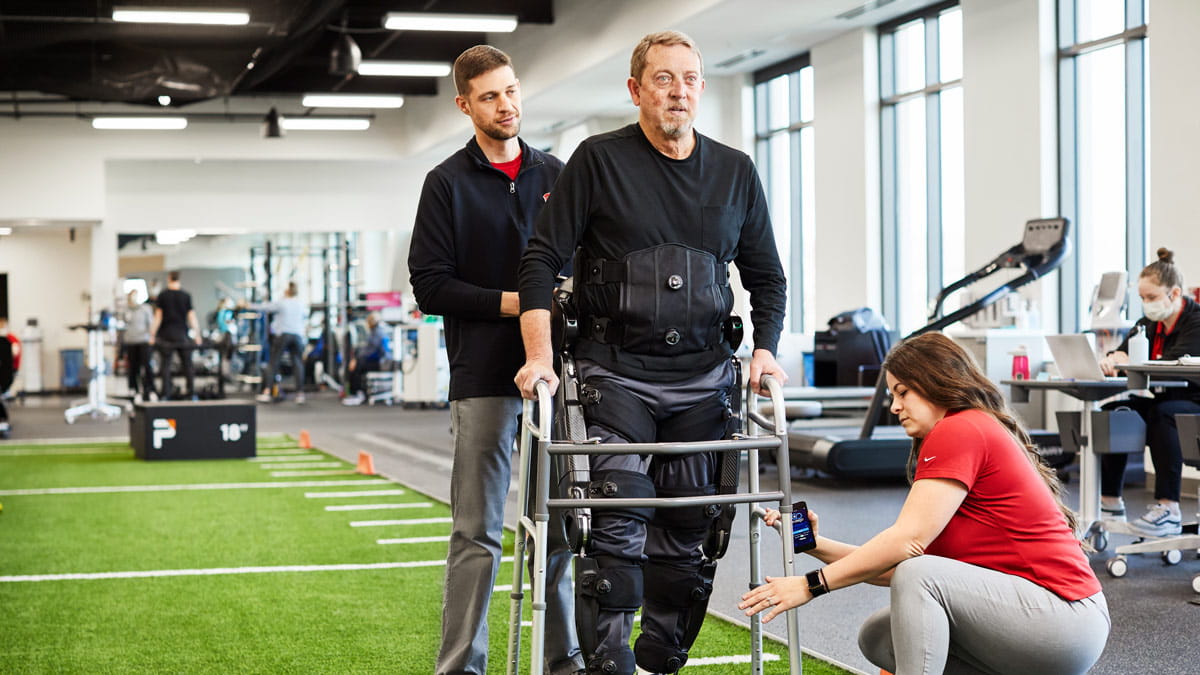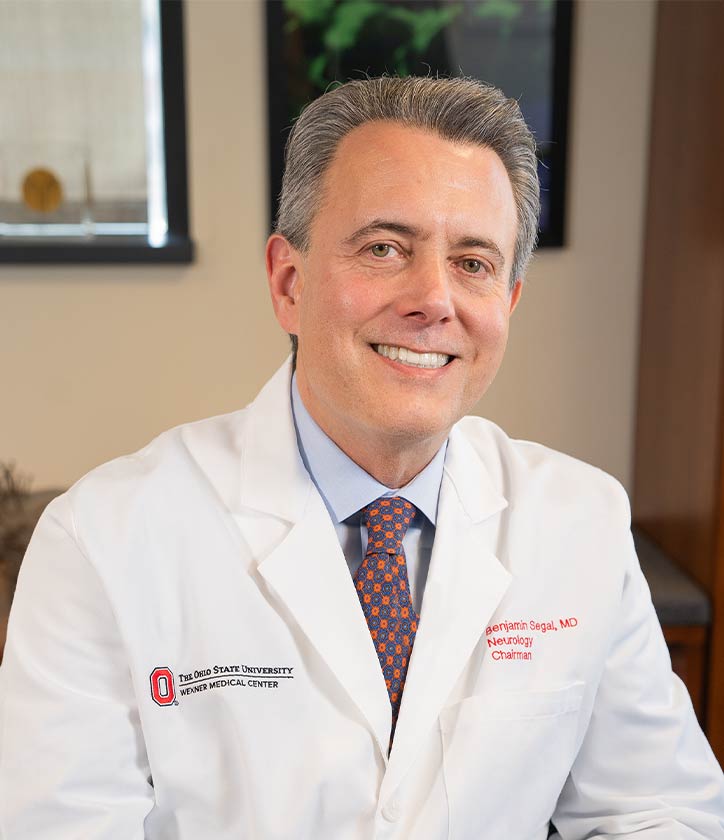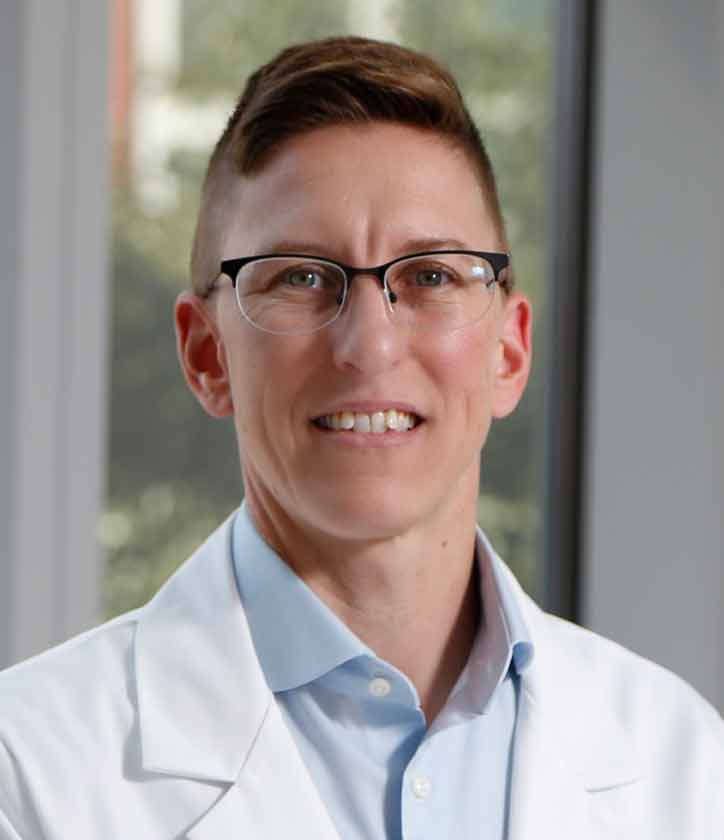Whether you’ve just been diagnosed with multiple sclerosis (MS) or have been managing symptoms for years, it can feel overwhelming to deal with this chronic condition. While MS is certainly a part of your life, we want to do all we can to prevent it from controlling your life.
To help accomplish this, the experts at the Multiple Sclerosis Center at The Ohio State University Wexner Medical Center can create an individual treatment plan that effectively addresses your specific symptoms with fewer side effects.
You won’t have to choose between world-class care and convenience either. Our MS Center is one of the largest and most comprehensive programs in the country, with a team of specialists working together to help you regain and maintain the best possible health.
Whatever services you need, we’ll always do what we can to set treatment schedules at locations and times that fit best into your daily routine, so every visit is productive and convenient. This includes ongoing medical care, education, rehabilitation, nutrition planning, mental health support, orthotics, genetic counseling, social services and physical, occupational, speech and respiratory therapy — anything you need to shift your focus from MS symptoms to your daily life and goals instead.
Watch an overview of the MS Center at Ohio State
Whether you’ve just been diagnosed with multiple sclerosis (MS) or have been managing symptoms for years, it can feel overwhelming to deal with this chronic condition. While MS is a part of your life, our MS Center can help prevent it from controlling your life.
Our team works together to give you the best MS care
The Multiple Sclerosis Center provides comprehensive care to patients with MS and other autoimmune neurologic conditions. We use a team approach that includes neurologists, ophthalmologists, MS specialists, clinical pharmacists and others to ensure the best outcomes for our patients.
What is MS?
Multiple sclerosis, often called MS, is a disease that attacks the central nervous system (CNS), which includes the optic nerves (the nerves that transmit visual information from the retina to the brain), brain and spinal cord. People with MS can experience a wide range of symptoms, including weakness, numbness, visual loss, double vision, imbalance and difficulties with memory and multitasking.
Nerve fibers are normally surrounded by a protective covering called the myelin sheath. In people with MS, the immune system inappropriately attacks and injures the myelin sheath and the nerve fiber that it’s wrapped around. As a result, communications between the central nervous system and the rest of the body are interrupted, resulting in a variety of symptoms. In the most common form of MS, the immune system strikes the CNS episodically, causing areas or patches of damage, called “lesions,” in the optic nerves, brain and spinal cord.
MS is different for each person. Some people may go through life with only minor problems, while others may become disabled. Although there’s no cure for MS, there are now drugs, called disease-modifying therapies, that can decrease the risk of relapses and future nervous system damage. Our goal is to help patients reach a state of “no evidence of disease activity,” meaning complete stability in neurological function and MRI scans, when possible.
Could it be something other than MS?
Sometimes, people without symptoms of an MS attack who undergo an MRI for other reasons, such as headache or head trauma, are incidentally found to have lesions that resemble the lesions seen in MS. These people should be examined by an MS specialist and may need additional tests. If they've never had symptoms suggestive of an MS attack and their exam is normal, they do not have and cannot be diagnosed with MS.
A scenario such as this is called radiologic isolated syndrome (RIS). The diagnosis of RIS is made when MRI pictures look very similar to MS, but there haven’t ever been symptoms of an MS attack. People with RIS should be under the care of an MS specialist and generally are monitored with annual MRI scans to detect future areas of inflammation in the brain and spinal cord, which sometimes don’t cause symptoms. In a five-year period, 34% of individuals with RIS will be diagnosed with MS after they develop symptoms of an MS attack.
When to call a doctor
Contact your doctor when you experience a new MS attack, when you begin having a symptom that you haven’t had before or when you notice a significant change in symptoms that are already present lasting longer than 24 hours.
About our multidisciplinary team
The Ohio State University Wexner Medical Center’s Multiple Sclerosis Center provides comprehensive care to patients with MS as well as with other autoimmune neurologic conditions. Care is provided by a collaborative team of medical professionals, including fellowship-trained neurologists, ophthalmologists, urologists, neuropsychologists, clinical pharmacists and physical therapists specially trained to care for patients with MS and related disorders. We utilize a team approach to ensure the best patient outcomes. Our clinic locations have radiology services, lab facilities and physical therapy all under one roof for easy patient access. Clinical studies are performed on-site.

Ms Patient Story: Barry Lynn
Hear from Barry Lynn about living with multiple sclerosis (MS).

MS Patient Story: Tim Rhode
Hear from Tim Rhode about living with multiple sclerosis (MS).















